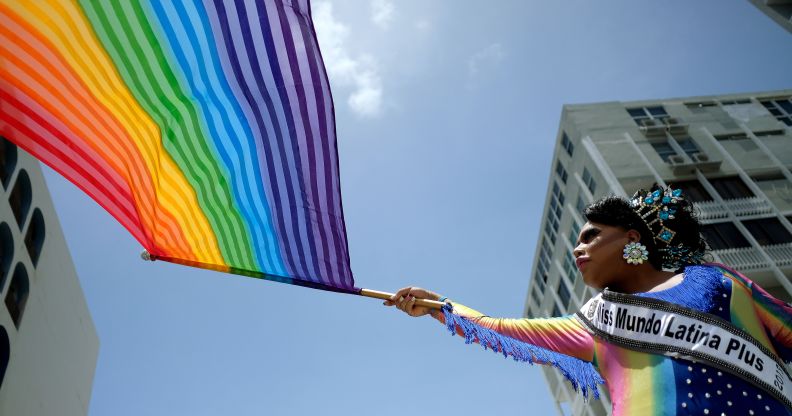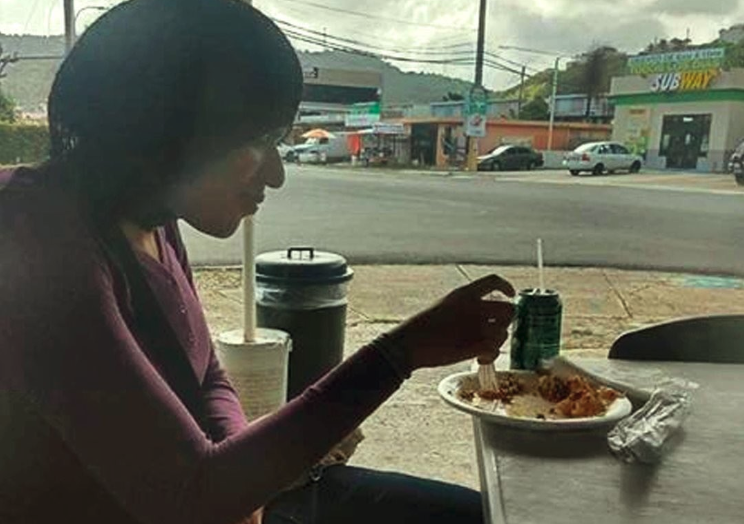Puerto Rico approves LGBT+ rights bill, but activists fear it will do more harm than good for trans folk

Puerto Rico’s Supreme Court has ruled that ‘X’ gender markers are permitted on birth certificates. (Ricardo Arduengo/AFP/Getty)
Puerto Rico’s Supreme Court has ruled that ‘X’ gender markers are permitted on birth certificates. (Ricardo Arduengo/AFP/Getty)
After a spate of brutal killings of trans women, Puerto Rico lawmakers approved a direly needed LGBT+ rights bill, but activists fear legislative gaps may only inflame the situation more.
The updated civil code, which covers non-criminal legal issues like marriage and property, passed the territory’s House of Representatives Thursday, Reuters reported.
Lawmakers aimed to infuse the code with measures to better protect Puerto Rico’s fragile queer community. Among the slew of changes include redefining marriage from “man and woman” to “two people”, better reflecting the 2015 Supreme Court decision legalising marriage equality.
However, legal experts and opposition lawmakers pockmarked the bill, stressing that gaps and contradictory wordings could spark legal hurdles for trans citizens moving forward.
Trans people in Puerto Rico stranded in a legal limbo thanks to revised civil code, activists say.
“On its face, it seems as if there’s nothing wrong,” Rafael Cox Alomar, a law professor at the University of the District of Columbia, told the outlet.
“But if you scratch the surface, there’s an obvious intent to discriminate.”
The amended civil codes were passed by Senators Monday, and will now head to the desk of the island’s governor, Wanda Vazquez.
“The current civil code of Puerto Rico is from 1930,” said representative José Melendez from the ruling New Progressive Party, “it’s totally and completely obsolete.”
“What is being done is updating,” he said.
But in scrubbing language from the code, critics say, it’s simply created a patchwork of contradictory changes.
For example. the language around trans people changing their gender on birth certificates has been punctured. The updated code states that nothing “undermines the process currently established” for legally changing a person’s gender.
But amendments to a person’s birth sex on original birth certificates “cannot be authorized”, according to the new code, sparking confusion among trans rights activists, who warn that this will strand trans citizens in a legal vacuum.
The revised civil code ‘constitutes a direct threat to our LGBT+ communities.’
“If on the one hand you’re prohibiting it and on the other, you are allowing it, it’s clearly unconstitutional,” said Pedro Julio Serrano, an LGBT+ activist.
“It lends itself to stigmatization and huge discrimination,” said Luis Vega, a congressman with the opposition Popular Democratic Party.
“That certificate would have a kind of mark or stain that distinguishes you from everyone else in Puerto Rico.”
Opposition lawmakers are rallying for the governor to veto the code revisions, one that would “erode the rights of women and constitutes a direct threat to our LGBTQ communities,” wrote representative Nydia Velazquez in a Twitter statement posted Friday afternoon (May 15).
Legislation altering the civil code in Puerto Rico constitutes a threat to our LGBTQ communities and would undermine a woman's right to choose. The Governor should veto this bill.
My full statement: pic.twitter.com/DokhPrjCLA
— Rep. Nydia Velazquez (@NydiaVelazquez) May 15, 2020
Five trans people killed in Puerto Rico in 2020 alone.
The deaths of Layla Peláez and Serena Angelique Velázquez in April ripped across the LGBT+ community, outraging activists who are steadily becoming numb to the relentless violence against trans people in Puerto Rico.
So far this year at least five trans people have been killed in the US territory.
Penélope Díaz Ramírez, 31, was killed in a correctional centre on April 13. Her death was not reported until April 27 by the Human Rights Campaign.

Police are investigating the murder of the trans woman Alexa Luciano Ruiz in Puerto Rico. (Twitter/@DavidBegnaud)
Yampi Méndez Arocho, a 19-year-old trans man, was killed in Moca on March 5.
In February, trans homeless woman Alexa Negrón Luciano, a well-known figure on Puerto Rican social media, was shot to death. Her final moments, mercilessly recorded on social media, capture the apparent impunity anti-LGBT+ attackers feel in their crimes.
Many of the cases echoed the brutal murder of gender-nonconforming teen Jorge Steven, found decapitated, dismembered and set ablaze in 2009.
Puerto Rican activists have desperately warned: “They are hunting us.”
“There is no longer any doubt, this is an epidemic of anti-LGBT+ violence,” said Serrano.

